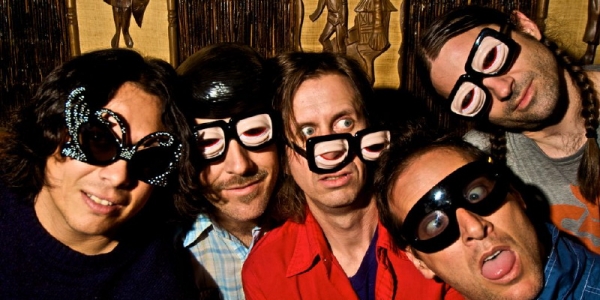Hot Snakes was borne from two earlier projects: cult San Diego post-hardcore groups Drive Like Jehu and Pitchfork, both formed by Reis and long-time collaborator, gravelly-voiced frontman Rick Froberg. They released three studio albums as well as the live album Thunder Down Under, recorded by triple j during the final leg of what was to be their last tour, until their reunion earlier this year. “I can’t really put myself back into exactly what I was thinking at the time, but I do remember that with each record, it felt like it was a lot more difficult getting things to come together,” Reis says. “A couple of the guys had been on the East Coast and a couple guys were on the West Coast and there was quite a bit of distance, and whenever we got together it felt like there was this pressure to capture lightning in a bottle and make something happen, and it put a lot of pressure on the band to have fun – with almost like a gun to your head. I think that kind of made people want to do other things, or break things down a little bit more, or take things a little less seriously.”
The reunion was sparked in 2010 when Obits (Froberg’s new band) toured with The Night Marchers, which features Reis as well as Hot Snakes members Gar Wood and Jason Kourkounis. When the four of them got together for a couple of songs, they were reminded of how much they – and their audience – loved their frenetic, jangly guitar rock. “We were able to do some shows with Obits and we were like, ‘Oh man, this is perfect, this is awesome’. We practiced a couple of songs [as Hot Snakes] and we did it, and that was really cool. I really missed playing those songs quite a bit. Some of my favourite guitar music that I’ve ever played is from Hot Snakes. And people were really excited by it.”
Of the almost innumerable reformations that have happened in recent years, Reis says, “It’s really easy to roll your eyes and be like, ‘Oh yeah, I guess they’re broke or something like that. Why don’t these fuckers stay broken up? I didn’t like them in the first place’, but at the same time, it’s kind of like, I’m one of those fuckers,” he says, laughing. “We’re one of those bands, and I’m glad we did it because we’re having a lot more fun now. We still have the distance between us, but it’s not our sole outlet for expression anymore. Now we can just get back together and play these songs we like to play and there’s a lot less pressure. I’m having a lot more fun, and I think everybody is. And we’re older, too… visibly so. So it’s kind of like, certain things that might’ve been really important to you, once you’re a bit older you realise that you really don’t care about those things so much anymore.”
BY DIJANA KUMURDIAN







